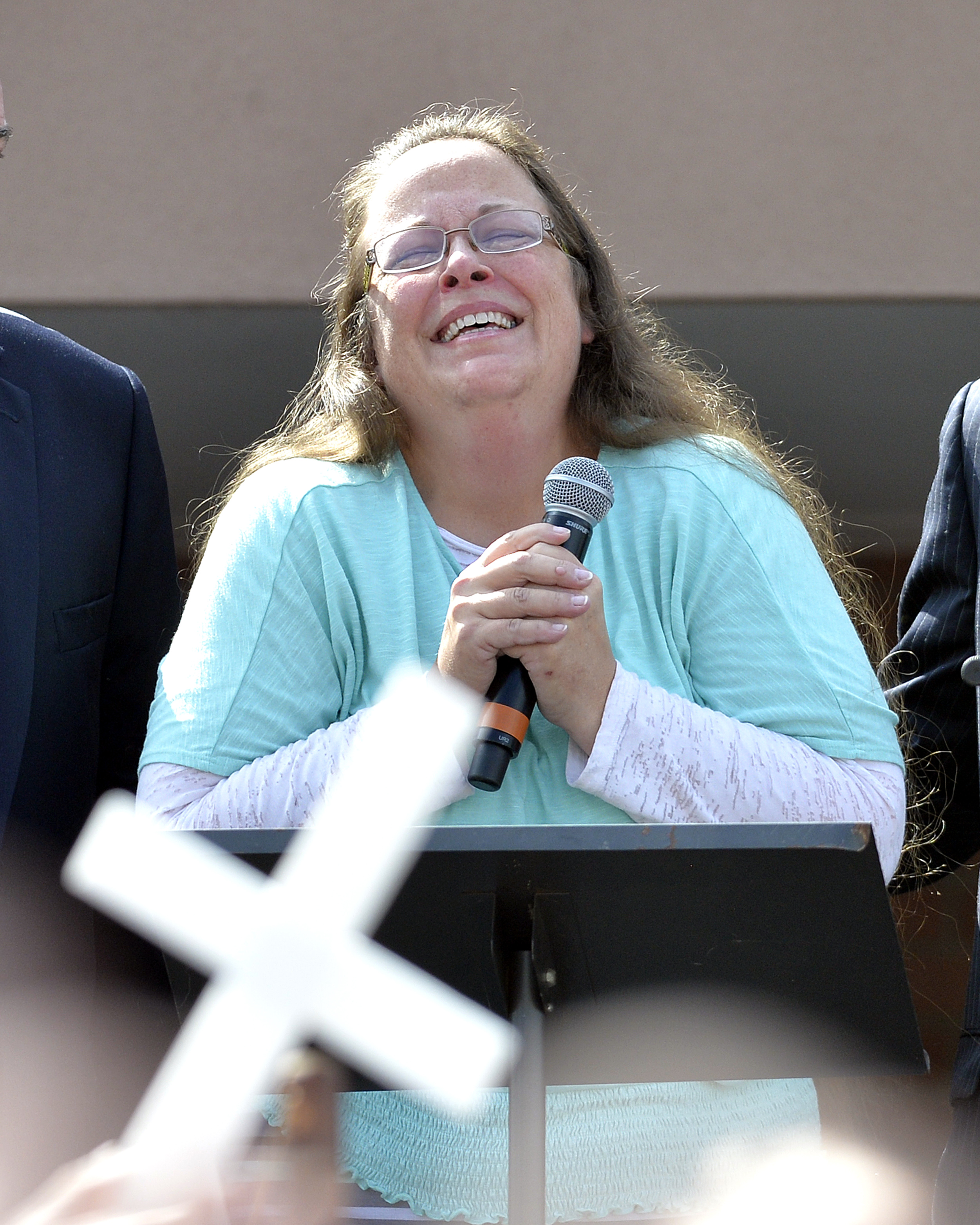Let's treat Kim Davis better than she treats gay couples
Supporters of gay marriage should not revel in the Kentucky clerk's legal troubles


Rowan County Clerk Kim Davis' refusal to issue marriage certificates to gay couples in Kentucky was a sad curiosity. I felt bad for the gay couples and embarrassed for Davis.
And then, after federal judge David Bunning threw Davis in jail, I felt angry.
To be clear: I wasn't angry because I knew the judge's ruthless over-reaction would almost certainly breathe new life into the moribund movement to use the law to treat gays unequally. No, what really made me angry was the assumption by Bunning that the government best enforces marriage laws at the point of its gun.
The Week
Escape your echo chamber. Get the facts behind the news, plus analysis from multiple perspectives.

Sign up for The Week's Free Newsletters
From our morning news briefing to a weekly Good News Newsletter, get the best of The Week delivered directly to your inbox.
From our morning news briefing to a weekly Good News Newsletter, get the best of The Week delivered directly to your inbox.
The state has a monopoly on force and violence. You don't need to be a libertarian to realize that the government's extreme powers must be exercised very carefully. The same impulse prefigures the argument in favor of criminal justice reform more generally.
I find the government's conduct more offensive to my sense of justice than I do Davis' refusal to comply with the law. And I say this as a dude who had to wait years to marry another dude.
In any moral universe, her crime should not justify a total deprivation of her civil rights.
The only real compelling government interest I can see is that a lack of sanction for her refusal to issue marriage certificates might encourage others to nullify the law. But that interest is best served by administrative penalties, like fines.
A free daily email with the biggest news stories of the day – and the best features from TheWeek.com
Her conduct may be illegal and hurtful. But it is not harmful.
I want the law to make that distinction. And if the law doesn't, because a crime is a crime is a crime, I think those of us who recognize the difference should lead the way and argue that making the distinction serves the cause of justice.
A lust for vengeance deprived Kim Davis of her freedom rapidly and comprehensively. And no, her refusal to recognize gay marriage rights is not nearly as offensive as what was done to her. Her clerk issued the marriage licenses she refused to issue. The context matters, as does the actual harm done by her to gay people, which, really, isn't that much.
What made me steaming mad was the delight expressed by many of my own fellow travelers at her imprisonment. We bathed in the glory of her personal life, too. That's offensive. Her personal life has no relevance at all to the issue at hand. And no, she did not invite such scrutiny by taking a public stand against gay marriage. All that matters is her conduct in office.
Those on the side of what's right should never revel in the pain of others. Gays and our allies are in the right. Now, let us set an example for how to treat those who are not.
Marc Ambinder is TheWeek.com's editor-at-large. He is the author, with D.B. Grady, of The Command and Deep State: Inside the Government Secrecy Industry. Marc is also a contributing editor for The Atlantic and GQ. Formerly, he served as White House correspondent for National Journal, chief political consultant for CBS News, and politics editor at The Atlantic. Marc is a 2001 graduate of Harvard. He is married to Michael Park, a corporate strategy consultant, and lives in Los Angeles.
-
 Political cartoons for January 3
Political cartoons for January 3Cartoons Saturday's political cartoons include citizen journalists, self-reflective AI, and Donald Trump's transparency
-
 Into the Woods: a ‘hypnotic’ production
Into the Woods: a ‘hypnotic’ productionThe Week Recommends Jordan Fein’s revival of the much-loved Stephen Sondheim musical is ‘sharp, propulsive and often very funny’
-
 ‘Let 2026 be a year of reckoning’
‘Let 2026 be a year of reckoning’Instant Opinion Opinion, comment and editorials of the day
-
 Bari Weiss’ ‘60 Minutes’ scandal is about more than one report
Bari Weiss’ ‘60 Minutes’ scandal is about more than one reportIN THE SPOTLIGHT By blocking an approved segment on a controversial prison holding US deportees in El Salvador, the editor-in-chief of CBS News has become the main story
-
 Has Zohran Mamdani shown the Democrats how to win again?
Has Zohran Mamdani shown the Democrats how to win again?Today’s Big Question New York City mayoral election touted as victory for left-wing populists but moderate centrist wins elsewhere present more complex path for Democratic Party
-
 Millions turn out for anti-Trump ‘No Kings’ rallies
Millions turn out for anti-Trump ‘No Kings’ ralliesSpeed Read An estimated 7 million people participated, 2 million more than at the first ‘No Kings’ protest in June
-
 Ghislaine Maxwell: angling for a Trump pardon
Ghislaine Maxwell: angling for a Trump pardonTalking Point Convicted sex trafficker's testimony could shed new light on president's links to Jeffrey Epstein
-
 The last words and final moments of 40 presidents
The last words and final moments of 40 presidentsThe Explainer Some are eloquent quotes worthy of the holders of the highest office in the nation, and others... aren't
-
 The JFK files: the truth at last?
The JFK files: the truth at last?In The Spotlight More than 64,000 previously classified documents relating the 1963 assassination of John F. Kennedy have been released by the Trump administration
-
 'Seriously, not literally': how should the world take Donald Trump?
'Seriously, not literally': how should the world take Donald Trump?Today's big question White House rhetoric and reality look likely to become increasingly blurred
-
 Will Trump's 'madman' strategy pay off?
Will Trump's 'madman' strategy pay off?Today's Big Question Incoming US president likes to seem unpredictable but, this time round, world leaders could be wise to his playbook
